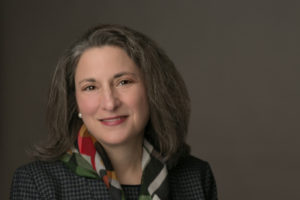Phoebe Stein Looks Back on Her Time at Maryland Humanities
Longtime executive director leaves post to become president of the Federation of State Humanities Councils.
Baltimore Magazine, February 28, 2020
by Lauren LaRocca
*****
 You could say that the humanities have become Phoebe Stein’s life’s work. After teaching writing and literature at Loyola University Chicago and earning her PhD in English, she wanted to gain nonprofit experience and started as an intern at what was then called Illinois Humanities Council (now Illinois Humanities). She later worked in their communications office for eight years before returning to Maryland, her home state, to become the executive director of Maryland Humanities, where she served for nearly 12 years.
You could say that the humanities have become Phoebe Stein’s life’s work. After teaching writing and literature at Loyola University Chicago and earning her PhD in English, she wanted to gain nonprofit experience and started as an intern at what was then called Illinois Humanities Council (now Illinois Humanities). She later worked in their communications office for eight years before returning to Maryland, her home state, to become the executive director of Maryland Humanities, where she served for nearly 12 years.
February marks Stein’s last month with Maryland Humanities. In May, Stein, 53, will become the president of the Federation of State Humanities Councils, broadening her reach to integrate the humanities into communities across the country. Before her last day, we sat down with Stein to look back on her more than a decade-long tenure with Maryland Humanities.
Humanities is such a broad term. What does that word mean to you, and why do you think it’s important?
Really broadly, what it means to me is the ways humans have understood what it means to be human. That’s what I think the humanities are. Literature, history, philosophy, ethics, the law, journalism, we also have some programs that support archaeology. Here [at Maryland Humanities], we bleed into the social sciences a bit. I think it’s important and I’m proudest of the work that we—and it’s definitely a “we” here—have done to show the value of using those lenses to give context to a current moment, understand the past, and think about the future. I think the humanities really equip us to do that.
Also for me, the humanities are not just areas of study or disciplines; they’re really what happens when we are coming together as communities, and that can be virtual or face-to-face. It is in the interchange, the exchange, and what we’re learning from each other.

